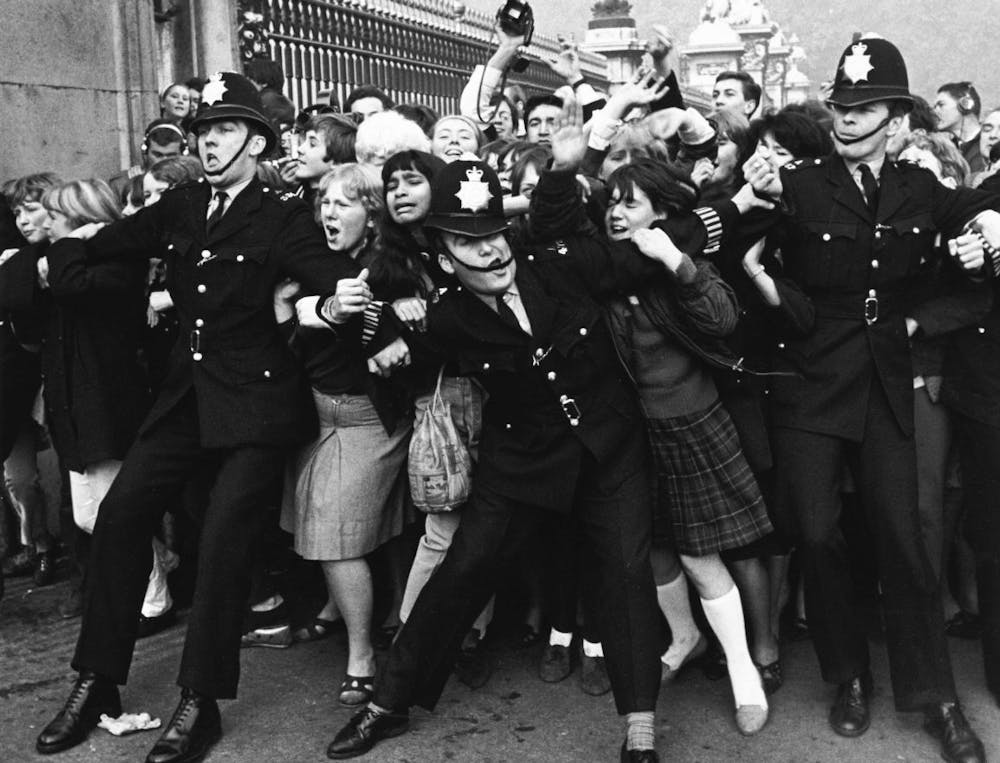If you’ve been following the news this week, you’ve likely seen Taylor Swift and Kansas City Chiefs tight end Travis Kelce’s rumored relationship front and center. Following her appearance at his football game, fans have been analyzing short clips of the two interacting in an attempt to piece together the details of their relationship. Even senators are speculating on how well-matched the two are.
Obviously, most people commenting on their relationship do not personally know Swift or Kelce beyond their carefully curated public presences. The craze surrounding them and Swift’s previous romances indicates a parasocial relationship between the public and the pop star. Teen Vogue defines a parasocial relationship as a “long-term attachment to a media figure (a blogger, an idol or even a politician) based on what a person ‘knows’ or understands about that figure over time.”
Parasocial relationships have existed long before Swifties. In the 1960s, The Beatles were at peak popularity, and the fanaticism of their fans was known as “Beatlemania.” Teenage girls formed fan clubs, snuck into their concerts and bought tons of The Beatles’ merchandise. Some reports said parents brought their sick children to their concerts, believing The Beatles’ music had healing power. John Lennon even remarked that the band was “more popular than Jesus.”
In the time since The Beatles, the ubiquity of fandoms has persisted. It’s easier for parasocial relationships to form now more than ever. Previously, fans' knowledge of their favorite celebrities was limited to their songs, performances and interviews. Now, fans have access to the details of celebrities’ private lives through social media.
If a fan desires, they have ample opportunity to immerse themselves in fan culture and seek out personal information about their favorite celebrity. This increased access has led many individuals to develop parasocial relationships with their favorite celebrities and feel as though they truly know them. Though a Snapchat story or TikTok may seem authentic, it is important for fans to recognize that celebrities are crafting personas that don’t always align with their true selves.
This is not to say that parasocial relationships are inherently wrong. They can serve as a form of escapism — when you’re going through a difficult time and want to focus on something outside of your own reality, immersing yourself in the world of a celebrity can be a welcome means of distraction. As a college student, it may be more appealing to mourn the end of Joe Jonas and Sophie Turner’s marriage than to mourn your failing physics grade.
But while there are benefits, the drawbacks of an unhealthy parasocial relationship can be severe: In 2013, One Direction fans camped out in a snake habitat behind the band’s hotel in Australia.
This may be a one-off case, but other examples of taking parasocial relationships too far include fueling celebrity drama and stalking.
In 2019, fans of YouTube celebrities Ethan Dolan and Grayson Dolan, known as the Dolan Twins, planned a meetup at their father’s funeral. The twins had to ask fans to respect their privacy to prevent this. This disrespectful behavior demonstrates fans’ unhealthy obsession with celebrities and their personal lives.
K-pop sasaeng fan culture is another example of parasocial relationships gone horribly wrong. Sasaeng — literally “private life” in Korean — fans have been known to obsessively stalk or otherwise invade the privacy of numerous Korean idols, motivated by a desire to be known by their favorite celebrities or stand out from the fanbase. The idol Lay Zhang from EXO reported fans falsifying their identities to break into his hotel.
Getting heavily invested in the life of a celebrity can negatively impact the mental health of both you and the celebrity. Parasocial relationships can make us feel like we know a celebrity very well, and when this perception is challenged, it can be difficult to reconcile it with what we thought we knew. The Try Guys fans were blindsided when member Ned Fulmer, who was known as a “Wife Guy,” was exposed for cheating on said wife.
We aren’t going to judge you for joining Nicki Minaj’s next Instagram Live or following Taylor Swift fan accounts on Twitter. But if you find that your real-life emotions are affected by the ups and downs of the celebrity news cycle, we hope that you take a step back and recognize your parasocial relationships are entering unhealthy territory.





